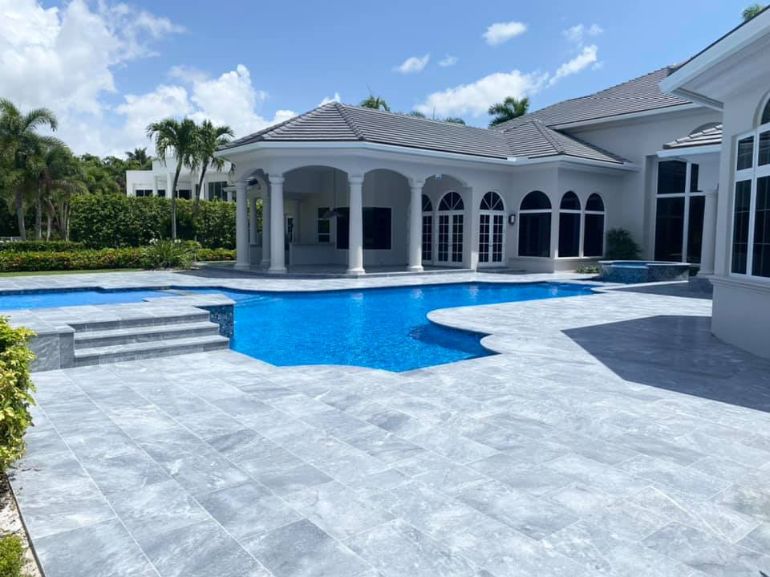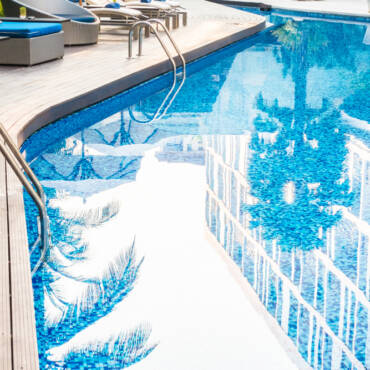Owning a pool can be a source of joy and relaxation for families, offering a perfect retreat on hot summer days and a focal point for outdoor gatherings. However, amidst the enjoyment, it’s crucial to prioritize safety, particularly when it comes to protecting loved ones, especially children, from potential hazards. Understanding and implementing essential pool safety measures is paramount for every homeowner with a swimming pool.
In this comprehensive guide, we’ll explore the top 10 pool safety tips that every homeowner should know. From securing your pool with proper barriers to being prepared for emergencies, each tip is designed to enhance safety and minimize risks associated with pool ownership. Whether you’re a new pool owner or a seasoned one, these tips will empower you to create a safer swimming environment for your family and guests.
Pool safety tips at home that you must be aware of
let’s dive in and discover how you can ensure a summer filled with fun and safety in and around the pool.
1. Secure Your Pool with Proper Barriers
Securing your pool with proper barriers is essential for ensuring pool safety. A four-sided fence with a self-closing, self-latching gate is the standard choice, preventing unauthorized access, particularly by young children. The fence should be at least four feet tall, without footholds or handholds for climbing, and the gate should automatically shut behind anyone entering or exiting the pool area. Additionally, pool covers and safety nets provide added protection when the pool is not in use, preventing accidental entry. These barriers installed by swimming pool contractors are crucial for minimizing the risk of unsupervised access to the pool area, especially for children, and are an integral part of creating a safer swimming environment for everyone in your household.
2. Learn CPR
Learning CPR (Cardiopulmonary Resuscitation) is a critical skill that every pool owner and user should possess. In the event of a drowning or other pool-related emergency, CPR can mean the difference between life and death. CPR involves chest compressions and rescue breaths, which help circulate oxygen-rich blood to vital organs when someone’s breathing or heartbeat has stopped. By knowing how to perform CPR properly, you can buy valuable time until medical help arrives, significantly increasing the chances of survival. CPR certification courses are widely available through organizations like the American Red Cross and the American Heart Association, offering hands-on training and certification that equips individuals with the skills and confidence to respond effectively in emergencies.
3. Supervise Constantly
Never leave children unattended near the pool, even for a moment. Drowning can happen quickly and silently, so it’s crucial to designate a responsible adult as a designated “water watcher” whenever the pool is in use. This person’s sole responsibility is to actively supervise the swimmers and remain vigilant at all times, without distractions like phones or reading materials.
4. Teach Swimming Skills
Ensuring that everyone in your household knows how to swim is essential for pool safety. Enroll non-swimmers in swimming lessons taught by qualified instructors. Learning basic swimming skills can increase individuals’ confidence and comfort in the water, reducing the risk of accidents.
5. Keep Safety Equipment Nearby
Having safety equipment readily available near the pool area is essential for responding quickly to emergencies. This equipment may include reaching poles, life jackets, a first aid kit, and a phone for calling emergency services if needed. Store these items in a clearly marked and easily accessible location.
6. Establish Pool Rules
Set clear and concise pool rules for everyone who uses the pool to follow. These rules should address behavior in and around the pool, such as no running on the pool deck, no diving in shallow areas, and no swimming alone. Make sure everyone understands and adheres to these rules at all times to minimize the risk of accidents.
7. Install Alarms
Consider installing pool alarms as an additional layer of protection against unauthorized access and accidents. These alarms can include gate alarms that sound when the gate is opened, surface wave sensors that detect movement on the water’s surface, or underwater motion detectors that alert you to activity in the pool. Pool alarms provide peace of mind, especially when children or pets are present.
8. Regular Maintenance
Keeping your pool in proper working order through regular maintenance and inspections is essential for safety. Check the pool’s equipment, such as pumps, filters, and drains, regularly to ensure they are functioning correctly. Maintain proper chemical levels to keep the water clean and safe for swimming, and address any issues promptly to prevent accidents or injuries.
9. Avoid Alcohol and Drugs
Refrain from consuming alcohol or drugs while swimming or supervising others in the pool. Alcohol and drugs impair judgment, coordination, and reaction time, increasing the risk of accidents and injuries. Stay sober and alert when enjoying time in or around the pool to ensure the safety of yourself and others.
10. Be Prepared for Emergencies
Developing an emergency action plan is crucial for responding effectively to pool-related emergencies. Make sure everyone in your household knows what to do in case of an emergency, including steps for rescuing a drowning person, calling for help, and administering first aid until medical professionals arrive. Practice your emergency action plan regularly to ensure everyone is prepared to act quickly and appropriately in a crisis.
Conclusion
In conclusion, prioritizing pool safety is not just a responsibility but a necessity for every homeowner with a swimming pool. By implementing the top 10 pool safety tips outlined in this guide, you can significantly reduce the risk of accidents and create a safer environment for everyone who enjoys your pool. Remember, vigilance, education, and preparedness are key. Supervise swimmers at all times, teach swimming skills to those who need them, and establish clear pool rules for everyone to follow. Additionally, investing in proper barriers, safety equipment, and alarms from Boca Raton pool builders can provide added layers of protection and peace of mind.



